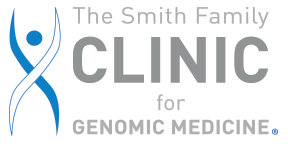Physician’s Frequently Asked Questions
1. How might my patient benefit from a visit to The Smith Family Clinic for Genomic Medicine?
The Smith Family Clinic for Genomic Medicine was established to diagnose rare undiagnosed disorders believed to be genetic in nature. If your patient has a condition that has eluded diagnosis, or their diagnosis doesn’t quite “fit,” or the traditional therapies and treatments are not effective, genetic testing may result in a molecular diagnosis that identifies the cause of disease.
2. What tests do you offer?
The Smith Family Clinic for Genomic Medicine offers a variety of genetic tests, dependent on the initial evaluation of a patient. These tests range from targeted gene panels to whole genome sequencing. A patient’s personal and family health history, medical records, and physical exam guide what kind of genetic test, if any, would be most beneficial in reaching a diagnosis.
3. How do I send a patient for a consult?
Potential patients may be sent for a consult by a healthcare provider via fax 256.327.9699 or electronic form (email to info@smithfamilyclinic.org). If you have any questions about whether a patient might be appropriate for a consult we encourage you to call our office at 256.327.9640.
4. Does a clinic visit obligate my patient to any type of testing?
Being evaluated in our clinic does not obligate someone to have genetic testing. If a particular test is recommended, we will discuss the benefits, risks, and limitations of testing, and the patient will be able to decide whether or not to have the test performed.
5. What is the likelihood of diagnosing my patient through genetic testing?
The likelihood of making a diagnosis varies widely depending on the patient’s symptoms and what kind of testing is performed. Based on our experience so far, the success rate for whole genome sequencing is around 30% in patients with suspected genetic disorders. Over time, as we learn more about the genetic causes of disease, we expect this number to increase.
6. What might my patient learn from genetic testing?
It is possible that genetic testing could identify an underlying genetic cause for your patient’s condition. There is also a small chance that this test could reveal additional information about your patient’s health or risk of developing disease in the future.
7. How might genetic test results impact ongoing care?
If a diagnosis is made through genetic testing, this information may be used to inform medical decision making and may direct management. In addition, this information may provide knowledge about risks to other family members to carry or be affected with the same condition. A physician who sends a patient to the Smith Family Clinic for a consult will receive documentation of the outcome of the visit(s), any genetic testing that is performed, and any recommendations for medical management following.
8. What are the potential risks of genetic testing?
It is important to keep in mind that genetic test results are sometimes inconclusive. A genetic variant may be found that the laboratory is unable to fully understand. It is also possible that a genetic variant is found that can cause a disease, but the exact risk of developing the disease, and the severity of the disease, is unknown. Most genetic variants are not determinative in an asymptomatic patient, i.e. they can not predict for certain whether disease will develop or not. Some people respond better than others to this type of uncertainty, therefore genetic counseling is important before a patient pursues genetic testing.
Many patients who have genetic testing have concerns about privacy and how their genetic information may be used and who it may be shared with. The Genetic Information Nondiscrimination Act of 2008 (GINA) protects individuals from having their genetic information used against them when obtaining employment or health insurance. Protected genetic information includes family history, participation in genetic testing or counseling, and specific genetic test results. However, this protection does not apply to other types of insurance, including life insurance and long-term care policies. For more information: https://www.genome.gov/10002328
9. Who will be involved in my patient’s care?
Our team includes a board-certified clinical geneticist, genetic counselors, and a clinic operations administration team. Please see our clinic team page to find out more about these individuals.
10. Do you provide specialty care to genetics patients?
The Smith Family Clinic for Genomic Medicine is a diagnostic clinic. A diagnosis may point to different treatment modalities and therapies; however, our clinical team is not typically involved in ongoing care of patients past the diagnostic process. At the conclusion of the diagnostic evaluation at the Smith Family Clinic, the provider who sent the patient for consult will receive documentation about the visit, testing that was performed, and follow-up recommendations. At the time a diagnosis is made, our clinicians may consult with the patient’s specialist team to help suggest a long-term treatment plan.
11. What kinds of costs might my patient incur?
The patient is responsible for the cost of the appointment at the time of service. Patients are also responsible for the costs of any genetic testing that insurance does not cover. We work closely with patients to review any recommended options for genetic testing including the cost and expected level of insurance coverage. If whole genome sequencing is ultimately recommended, it’s important to note that most health plans do not currently cover whole genome sequencing. The Hero Fund was established to help provide financial assistance for patients of the Smith Family Clinic who have significant financial needs.


